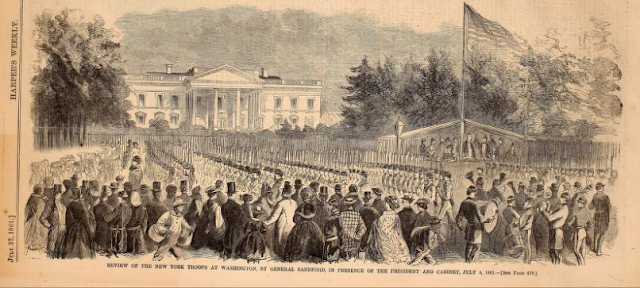This Week in History: Part Four
The latest installment of This Week in History takes us back
to the American Civil War, specifically July 27, 1861. Harper’s Weekly, A Journal of Civilization was an American
political magazine which was the most widely read publications of the 19th
century. Famous for their illustrations, Harper’s
Weekly featured foreign and domestic news, works of fiction, and political essays.
The USF Archives holds volumes five, six, and seven (1861-1863), but today I’ll
be focusing on volume 5, issue 239.
It was the beginning of the war, with the Battle of Bull Run
– the first major land battle of the Civil War – fought the previous week on
July 21st. However, details of battles usually came out a couple
weeks later. The
editors of Harper’s fully supported
President Lincoln and the Union once the war began, but because of their wide
readership in the southern states they took a moderate stance on slavery.
Readers of issue 239 were presented with news and
illustrations from earlier in the month, including the “Grand Review of New
York Troops on July 4th”. A Harper’s
Weekly correspondent described it thusly: “The parade of twenty thousand
New York troops…come off in the morning according to programme. A stand was erected
on the sidewalk of Pennsylvania Avenue, in front of the White House, which was
occupied by the President… (page 479).”
 |
| "Grand Review of New York Troops on July 4th" |
The illustration shows the moment
President Lincoln introduces General Winfield Scott, the longest active duty
general in American history:
"Fellow citizens—I trust you will not blame me today for
standing in front. It is a sort of rule that constrains me to do so. I know
that a sight of your noble and gallant and revered General Scott would be more
gratifying to you than a speech from me. I take great pleasure, therefore, in introducing
that distinguished gentleman to you (page 479)."
 |
| Chapter 56 of Great Expectations |
While the war and news from Congress took up a majority of
the magazine, there was space for authors to send in chapters from their books.
Charles Dickens’ Great Expectations
was featured in Harper’s from
November 1860 to August 1861. The fifty-nine chapter book was released in nine
parts over that period, with chapter fifty-six in the July 27th
issue. Accompanied with illustrations from John McLenan, the chapter sees the
death of Magwitch, the convict turned secret benefactor to Pip, the
protagonist.
Advertisements for medical remedies, hair treatment for mustaches,
wedding cards, and employment opportunities are also featured in Harper’s Weekly.
After the war, the magazine fully supported the Republican Party
and cartoonist Thomas Nast made it famous with his attack on corrupt New York
politician William “Boss” Tweed and Tammany Hall.
If you are interested in reading the full July 27,
1861 issue please stop by or make an appointment to visit the USF Archives,
open Monday to Friday.


Comments
Post a Comment